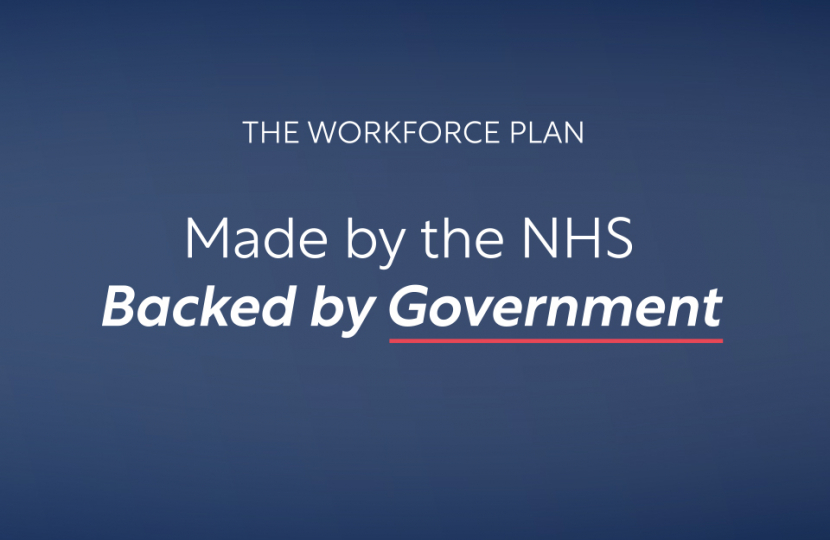
Rebecca Harris MP strongly welcome the publication of the first NHS England Long Term Workforce Plan. This was commissioned by the Government to set out a series of interventions based on the principles of ‘Train, Retain and Reform’ and put the NHS on a sustainable footing into the future.
Backed by more than £2.4 billion in Government investment, it sets out how the NHS will address existing vacancies and meet the challenges of a growing and aging population by recruiting and retaining hundreds of thousands more staff over the next 15 years and reforming the way we work.
The Plan outlines the steps needed to:
- Train more staff so that we have the right number of doctors, nurses, allied health professionals, pharmacy staff, healthcare scientists, dental professionals and others to meet the health needs of the population.
- Retain our dedicated NHS workforce by allowing greater flexibility and improving culture, leadership and wellbeing.
- Reform the way we work so that healthcare staff have the right multidisciplinary skills and can harness digital and technological innovations, allowing them to focus on patient care.
Training
We will:
- Double the number of undergraduate medical school training places by 2031 from 7,500 today to 15,000, with more medical school places in areas with the greatest shortages. A higher proportion of new medical students will carry out their postgraduate training in services such as primary care, mental health and cancer.
- Increase the number of GP training places by 50% to 6,000 by 2031.
- Nearly double the number of adult nurse training places by 2031, with more than 24,000 more nurse and midwife training places a year by 2031. Within this we will train over 5,000 more mental and learning disability nurses a year.
- Expand dentistry places by 40%, reaching 300 more training places for dentists and dental care practitioners by 2031.
As a result of these domestic training expansions, we will reduce reliance on agency staff and international recruitment. In 15 years’ time, around 10% of our workforce to be recruited internationally, compared to nearly a quarter today.
Retention
We will:
- Build on earlier reforms to the legacy NHS pension scheme to enable a ‘decade of retirement’ approach.
- Pilot the Digital Staff Passport later this year, which makes it easier and simpler for NHS staff to move between NHS organisations.
- Explore a tie-in so that newly qualified dentists spend a minimum proportion of their time delivering NHS care in the years following graduation.
- Implement existing commitments, including tackling violence against NHS staff, reviewing the support newly qualified staff receive, and continuing national funding of £1,000 a year for continuing professional development for nurses, midwives and allied health professionals.
- Invest in occupational health, including musculoskeletal and mental health services, so staff can stay healthy and work to their full potential.
- Enable newly-retired doctors to carry on providing care by re-joining the NHS to do outpatient appoints, either virtually or in person, through a new digital platform available this autumn for people to sign-up to.
This aims to ensure up to 130,000 more staff to remain in the NHS than would otherwise have been the case over the next 15 years.
Reform
We will:
- Train more physician associates, anaesthesia associates, nursing associates and advanced practitioners to improve the breadth of skills in multidisciplinary teams and the flexibility of the workforce – increasing the proportion of these roles fivefold over the next 15 years.
- Modernise the system of regulation for healthcare professionals, making it faster, fairer, more flexible and less adversarial. This includes bringing physician associates and anaesthesia associates under General Medical Council regulation by the end of 2024 so they can prescribe medicines, freeing up the time of more senior clinicians.
- Build extra capacity in general practice, with an additional 15,000 direct patient care staff and 5,000 more primary care nurses over the next 15 years.
- Allow doctors other than GPs to work in general practice, under the supervision of a fully qualified GP.
- Ensure doctors in their first year out of medical school have at least one four-month placement in general practice from August 2025 to ensure our doctors of the future are equipped with the generalist skills they need to care for an older population living with multiple conditions.
- Provide a quarter of all training for clinical staff through apprenticeship routes by 2030, up from just 7% today.
- Further expand medical apprenticeships so that 850 medical students will qualify through this route by 2028, compared to a pilot of just 200 today.
- Make use of Brexit flexibilities to introduce four-year, rather than five-year, medical and allow graduate nurses to join the nursing register after fewer practice hours, if they meet the same established standards set by the professional regulators.
- Embrace new technologies, for example, working with the Royal College of Surgeons on the effective introduction of robotic surgery and working with the Royal College of Radiologists on the use of artificial intelligence in radiology
Prime Minister Rishi Sunak said: “On the 75th anniversary of our health service, this government is making the largest single expansion in NHS education and training in its history. This is a plan for investment and a plan for reform. In the coming years we will train twice the number of doctors and an extra 24,000 more nurses a year, helping to cut waiting lists and improve patient care. And we will do more to retain our brilliant NHS staff and reform the way the health system works to ensure it is fit for the future. This is something no other government has done and will be one of the most significant commitments I will make as Prime Minister – acting as the cornerstone for our vision for a better, more modern healthcare system and putting the NHS on a sure footing for the long term.”
The plan is an important step in supporting the NHS to prepare for the challenges our health and care system will face in the future. The NHS will refresh the Plan to reflect changes in context and meet future requirements.
